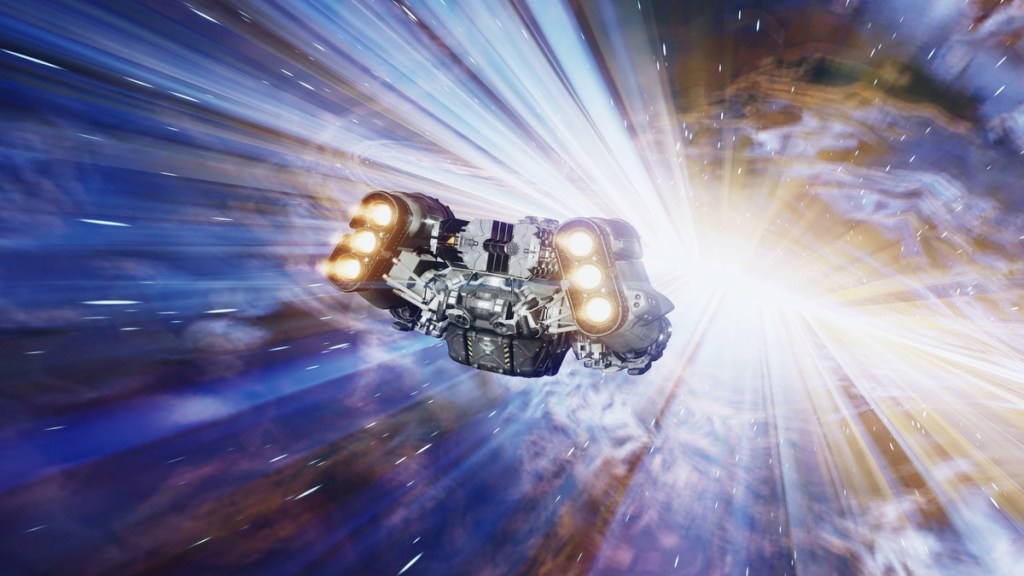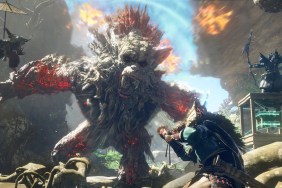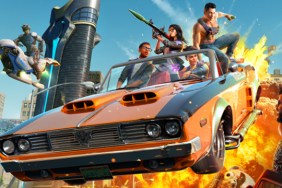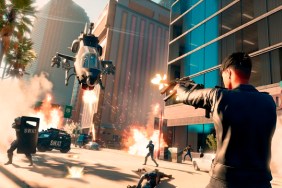Starfield was one of my most anticipated games of 2023. I love sci-fi, and the idea of captaining my own ship and exploring the cosmos has enthralled me for the three decades I’ve been alive. Unfortunately, gaming has a hard time capturing a topic on such a large scale. However, I hoped that Bethesda would get closer than any others had so far. Unfortunately, after playing the game, it seems the final frontier is still beyond our grasp.
Stargate: New Atlantis
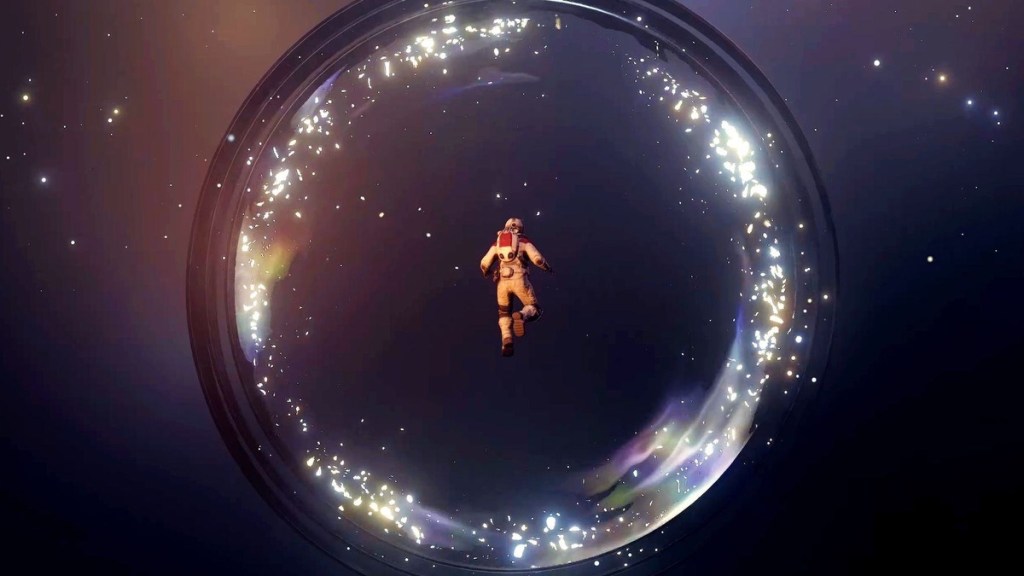
The main quest hook in Starfield is that you’re a simple space miner who’s stumbled onto an artifact while working. When you touched it, you saw visions and heard music. (It’s almost exactly the same idea as when Shepard touched the Prothean Beacon in Mass Effect, minus the apocalyptic portents.) You’re no worse for the wear, but then pirates show up looking for booty. Luckily, they’re incompetent, so you quickly kill them. Then another dude lands and tells you he had a similar experience and that you need to take the artifact to the HQ of some organization called Constellation. Then, he gives you his robot and ship and tells you to blast off.
At this point, you’re free to do whatever. You don’t even have to complete the first story mission if you don’t want to. You can go join factions, level up, build ships and outposts, whatever. However, suppose you choose to meet Constellation at the Lodge in New Atlantis. In that case, you’ll learn that these artifacts are scattered throughout the galaxy, and the organization wants to gather them to see what they do.
Despite humanity’s diaspora into space, they’ve never encountered other sentient life. So, your main impetus is to determine if these artifacts prove that there’s other intelligent beings out there. However, the main quest is just a small amount of the story content available in the game. There are multiple factional storylines and what seems like an endless amount of smaller mission chains and one-off quests throughout the galaxy. Unfortunately, it’s all an ocean-wide and a puddle deep.
Generic Space

Starfield’s universe is a hodgepodge of ideas from other sci-fi properties. Of the main factions, United Colonies is a slightly nicer version of Starship Troopers’ United Citizen Federation, the FreeStar Collective is just Firefly, the Crimson Fleet are generic space pirates, Ryujin Industries is your typical cyberpunk-esque megacorp, and House Va’ruun is basically The Orville’s Krill or Riddick’s Necromongers.
The game has a sterile feel that is surprising compared to Bethesda’s previous titles. Fallout and the Elder Scrolls were never afraid to get a little bloody or weird. However, there’s a distinct lack of that here. Space is a setting where you can really bust loose with horror and adventure, and while there are a few cool encounters and locations that tap into Bethesda’s roots, most places I visited felt like they were missing something.
This is most obvious in the procedurally-generated content, which includes random outposts, caves, etc. Most of these are just filled with random space pirates or nasty little critters and lack any environmental storytelling. It’s fun collecting loot and clearing dungeons for a while, but eventually, the content starts to loop, and you get a feeling of deja vu as you pass through a building with the same structure and enemy placement as one you went through before.
I don’t care if your daughter likes books Sam

Companions are supposed to be a highlight of Bethesda games, but I found the four main followers in Starfield to be incredibly dull. The one I kept around for most of the game was Sarah, who only really spoke to me to give me some trash she found on the floor or to beat herself up and scold me when I told her not to be so hard on herself. Then you have Barrett, whose only personality trait is that he’s apparently “out there,” but in actuality is just slightly quirky. Shortly after the game started, I was introduced to Sam Coe, who has daddy issues and a daughter that only exists to echo how much she loves books through my ship. Rounding out the bunch is Andreja, who is portrayed as mysterious and violent but is instead incredibly vanilla and transparent.
The biggest problem is that none of them had any force of personality, likely because Bethesda decided to play this universe way too straight. So, you won’t run into irritating, single-minded patriots like Preston Garvey, noir-detective androids like Nick Valentine, or kind-hearted outsiders like Fawkes. Instead, you have a bunch of ordinary people with ordinary people problems. That’s fine in real life, but when I’m out on the edge of the frontier trying to solve one of the greatest mysteries humanity has ever faced, I want some characters with me.
It got to where I just started telling my companions to stay on the ship. They rarely factor into any quests you’re doing anyway. Around 40 hours in, I got tired of them telling me they had some mundane item to give me or asking me to talk about something that happened in the story 3-4 hours ago.
Star Bores
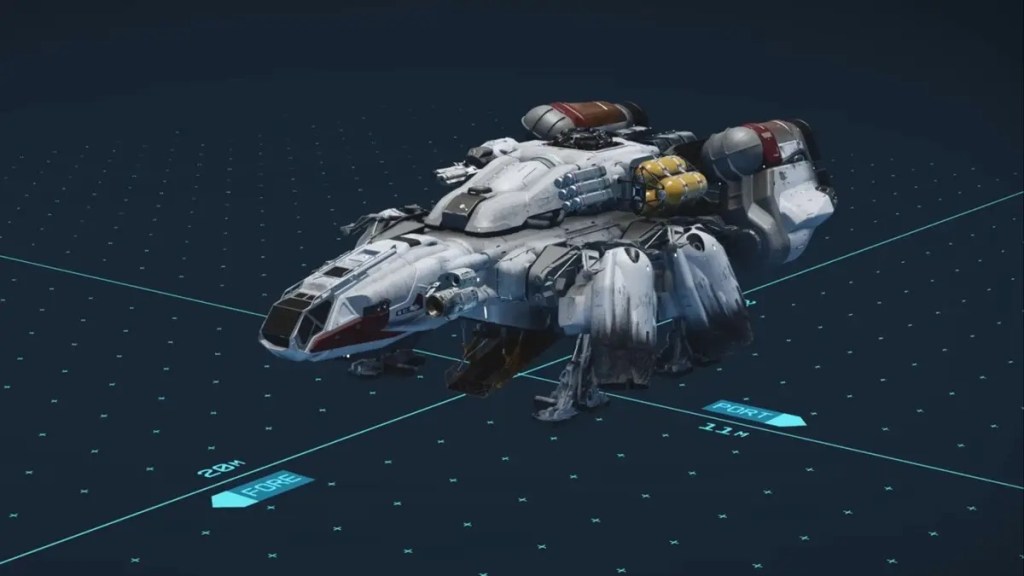
You get a ship not long after the game begins, which had me pumped. Unfortunately, one of my most eagerly anticipated features of Starfield, the shipbuilding, is one of the most half-baked. The most infuriating aspect of it, though, is that you can’t choose where doors and ladders are placed. So, if you make a larger ship, you’re usually left with a labyrinth instead of a logical layout.
Of course, even if you get a ship built that you like, there’s no real point in putting much thought into it because the interior is purposeless. You can assign crew to a ship, but you can’t tell them to work a particular station, so they just roam aimlessly through the corridors, occasionally stopping somewhere to pretend they’re taking inventory or working on a computer. They have different skills that supplement yours and give stat boosts to ship systems, but that’s all done behind the scenes without affecting how they behave.
When Bethesda revealed you could have your own crew, I was excited at the possibilities. I had hoped you could do something relatively simple, like assigning a doctor to your ship’s infirmary and getting a bonus to health or free med packs. Instead, there’s no point to most ship modules. Instead, outside of the workshop, most of them are for show and serve no function other than to provide ambiance. Those that do serve a purpose just give you extra crew and passenger slots.
Unfortunately, you can’t even decorate your ship because each time you change the layout, all the interior items are removed to your cargo hold. I speculate this is because the game just generates a new map for the interior each time instead of saving the state of each individual module. So, instead of just moving the items affected by a module being swapped out, it wipes the slate clean.
Deep Space Cryin’

Outposts are easier to customize but have similar issues. These are basically larger Fallout 4 settlements. However, unlike that game, where you could assign beds and jobs to give the illusion of life, you send crew members to a base, and they just roam around and play an animation like they’re working on a random task from time to time.
The biggest issue with Outposts is that they’re relatively pointless. They can harvest resources from planets, grow plants in hydroponic modules, and automatically construct industrial parts. However, you only really need resources to craft mods for your gear, produce health items and stat boosters, and build more outposts. The catch is that you make so many credits by completing missions and selling loot that you can just buy the resources you need, making outposts superfluous.
These would be a lot more fun if they acted like colonies, which would attract random NPCs to live and work there. You’d have a reason to keep an eye on outposts if you had to manage how many beds they had or meet your colonists’ needs. As is, the system feels unfinished.
Liesploration

I was hoping that exploration would be the game’s saving grace. After all, there’s so much to see out there in Starfield’s galaxy. While the handcrafted stuff is high-quality for the most part (if a little bland), the procedurally generated elements end up hurting the experience.
Previously, Bethesda said that you could land anywhere on a planet, pop your little head out, and explore to your heart’s content. That’s not a lie. You can travel to any planet, scan it, mark a location, and touch down. However, you’re not actually “landing” on the planet. Instead, each time you mark a random place (non-handcrafted) to touch down at, the game generates a new map based on what the biome is supposed to be and what resources, flora, and fauna belong there that don’t interact with any other part of the game.
So, when you touch down next to an ocean on a balmy earth-like planet, you’ll see water, and there’ll be animals and plants to scan, but it’s just an abstraction. Touch down again right next to this location, and the game will generate another map that has zero interaction with the first. An egregious example would be that you can touch down just outside New Atlantis, and you won’t be able to see the city because the game doesn’t consider that it should be there in the distance.
This ruined exploration because you’re never actually exploring a planet. You’re just generating random maps that have nothing to do with each other or the world you’re orbiting. I would rather there have been a limited number of landing sites on each planet, with the excuse that your ship can only touch down in the right kind of terrain or something. That would have at least maintained the illusion.
Fallout 4 in space
Starfield would have been an impressive game ten years ago, but on a technical level, it’s not far beyond Skyrim or Fallout 4. The graphics have been updated, but it has the same issues that Bethesda games have had since Morrowind. Animations continue to be rough, and most NPCs look lifeless when they’re talking to you, which is exacerbated by the insistence on the awkward close-up camera during each conversation. Bugs abounded for me as well. Numerous conversations turned into slapstick as NPCs got stuck in their idle animation or continued walking away when speaking with me.
Previous Bethesda games had a contiguous overworld, so loading wasn’t as noticeable or as often, but Starfield relies way too much on menus and loading screens. Where most games try to make the experience as immersive as possible, here you’re constantly loading into buildings, opening your menu to fast travel, loading as your ship jumps to a new star system, loading to land on a planet, loading to enter your cockpit, and loading to take off. Loading times are mercifully short on an SSD, but all these micro-interruptions add up.
Starfield Review: The Final Verdict
When scoring Starfield, I considered that many of my issues with the game were totally subjective. However, the game does have technical and design issues that can’t be ignored. Ironically, it has many of the same problems people relentlessly criticized Cyberpunk 2077 for, like lifeless crowds, a hollow wanted system, and glitchy animations, but it’s largely getting a pass. Bethesda deserves kudos for pioneering the modern Western RPG format, and I don’t think every game needs to be some innovative revolution. Despite this, Starfield is backed by Microsoft and produced by one of the biggest game companies in the world. There’s no reason it should feel and play like Fallout 4 in space.
Positives and Negatives
-
There's a lot to do.
-
Graphics are improved from previous Bethesda titles.
-
Most of what the game has to offer is bland. (Your milage may vary.)
-
Encountered lots of bugs with conversations and animations.
-
Ship and outpost building need revamped badly.
